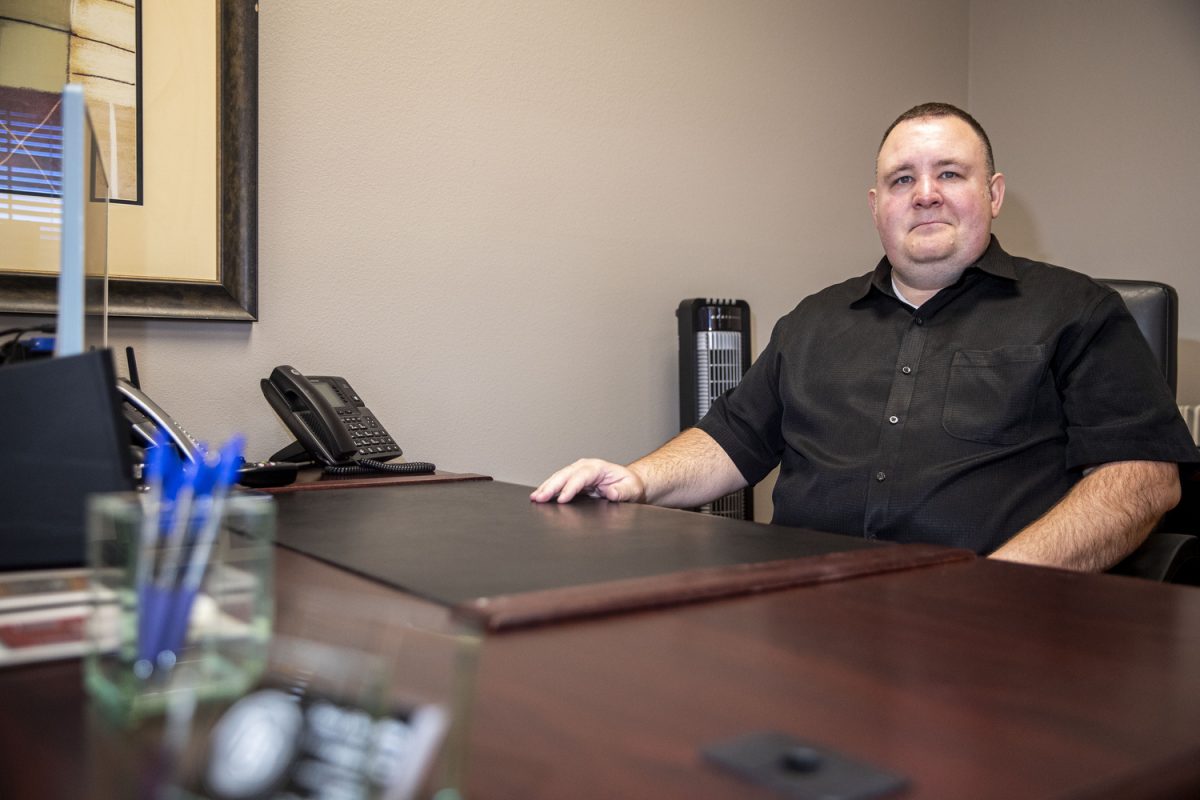Tracy Barkalow, a longtime real estate agent and Iowa City landlord, has been a significant figure in Iowa City’s student housing market for more than 20 years.
His stake in Iowa City, however, could be diminishing soon.
His company owns a large swath of residential properties, leading thousands of University of Iowa students to rent from him each year. In the downtown district, Barkalow owns at least seven buildings, totaling 5 percent of a section of downtown analyzed by The Daily Iowan. The City of Iowa City, in comparison, accounted for 6 percent.
Barkalow had a modest upbringing. He grew up in a four-bedroom house in North Liberty, where his mom raised him and his eight siblings.
“I guess that’s kind of what’s made us who we are today. We’re strong. All of us are strong people because of it,” Barkalow said in an interview with the DI.
That strength, he said, is part of what has made him successful as a real estate agent and a landlord. Bakalow said it has taken constant hard work to achieve what he’s been able to do in Iowa City.
But he said times are changing for landlords in the city.
Barkalow plans to sell off his entire residential property holdings in Iowa City, he said, attributing the decision to ongoing challenges in managing tenant relationships and the difficulties of operating in a city he believes is resistant to change.
“I believe within the next five years … My goal is not to own any residential units in Iowa City,” Barkalow said.
Barkalow said he believes there is resistance in the city for developers, which is part of the reason why he wants to divest. He pointed to a multi-year legal battle he had with the city about developing an apartment complex on North Governor Street that would add 84 units.
To accomplish the development, Barkalow needed the property rezoned to allow for larger developments. The Iowa City City Council denied Barkalow’s request, which led him to sue the city. By 2018, the Iowa Supreme Court ruled the city’s zoning policy for the property was inaccurate, and Barkalow could proceed with his project.
But this was not the first time this property was involved in a legal dispute.
The decision to let Barkalow proceed was founded off of a 1987 Iowa Supreme Court case that dealt with the same property. The court found the zoning on the lot did not promote enough development, according to city documents. So, until the lots were developed, they would be zoned for high density development, which was the case when Barkalow inquired on developing the property.
“It’s a good opportunity to increase the housing surplus in Iowa City. It’s good for the overall market. It increases tax base,” Barkalow said. “I just don’t understand what the goal is for Iowa City, to be honest with you.”
Ultimately, Barkalow said his plans to sell all of his residential property do not come from a disdain for the city, and the decision was challenging because he’s spent so much time trying to develop here.
“I’m not a perfect angel by any means,” Barkalow said, reflecting on his career as a landlord. “I’ve had bumps in the road, and I’ve made bad decisions as I go through some things, but I change, and I get better, and I try to do better and be a good part of the community.”
While Barkalow reflects on his experience in the Iowa City market, local business owner Katy Brown offers a different perspective on the relationship between landlords and tenants.
Brown, who owns the recently opened Kitty Corner Social Club on South Clinton Street, claims Barkalow’s reputation among tenants has been problematic for years.
RELATED: Iowa City’s Sanctuary Pub closes after 52 years of business
Since opening her business in February, Brown alleges many landlords, including Barkalow, have failed to prioritize communication with tenants.
Brown said she wants to use her business on South Clinton to be an example of how to treat people properly and give people a space where they feel welcomed because she believes landlords in Iowa City are not treating students properly.
She said her experience having four children renting in Iowa City has shaped her view toward landlords’ approach to tenants.
“Students are living in disgusting conditions,” she said. “The communication of these companies is absurd. Yeah, they don’t have office hours, [and] they don’t answer their phones. I don’t understand how you can have a company in the state of Iowa, a for-profit company, and not be accountable.”
Barkalow said he believes the issue with Iowa City is its unwillingness to expand and develop like neighboring towns.
“Unfortunately, the city itself has not been embracing development or embracing any change. So, Iowa City has kind of been stale, in my opinion, on what it could be,” Barkalow said. “A lot of people in Iowa City are upset for me wanting to make changes or make the next step or chapter for Iowa City.”
Longtime Iowa City resident Vera Gross, whose family has owned a building on South Clinton Street since the 1980s, disagrees with the idea that Iowa City hasn’t been developing but acknowledges it is done so in a unique way.
Gross’ building houses a clothing store and two apartments. Since the 1980s, Gross said retailers have slowly trickled out of town, and in their place are bars and other businesses catered toward nightlife.
“Things change. There’s progress. There are a lot of positive things that have happened, but it’s harder for an independent retailer,” Gross said.
She said Iowa City has maintained much of its historical value throughout the years, but many of the houses in neighborhoods are dilapidated because of landlords and unresponsive property management companies.
“There are definitely people who take shortcuts or simply just don’t do it until they get pushed into it,” she said.



